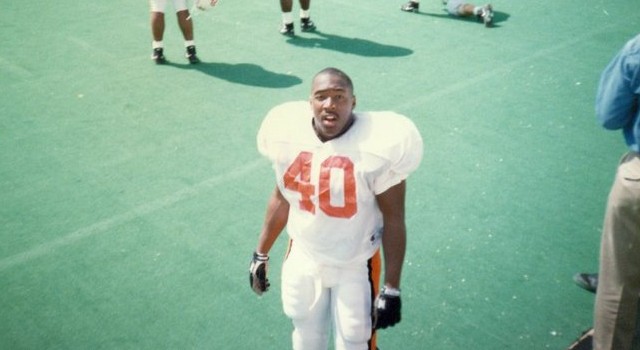The old saying is “there is no I in team.” While this is true on the playing surface, off of it is a different story. Few players, coaches or other members of the organization can be accurately described as the face of the program. In the case of Joe Paterno, he was not only the face of the Penn State football team, but the face of the school and arguably the face of college football. At approximately 10 a.m. a statement was released from the Paterno family confirming that Paterno had passed away after his brief battle with lung cancer. Paterno was 85-years old.
Paterno, born in Brooklyn, New York in 1926, attended school at Brown University where he played quarterback. Instead of following his parents’ wishes for him to become a lawyer, Paterno instead followed his college coach Rip Engle to Penn State where he took an assistant coaching position for $3,600 a year. Paterno served as an assistant coach for 15 years before taking over as head coach in 1965. Paterno led Penn State to two national championships in 1982 and 1986 and won four Orange Bowls, two Cotton Bowls, six Fiesta Bowls, one Sugar Bowl and one Rose Bowl.
Paterno led five of his teams to an undefeated record, four of those teams not named national champions. In 1969, Penn State went undefeated and won 30 straight games. President Nixon however said that the end of the year game between No. 1 Texas and No. 2 Alabama was the national championship game. Nixon attempted to call Paterno and give him an award for the longest winning streak in college football. Paterno answered and told the president to shove it.
Paterno was more than a coach to his players; he was a father figure to many of them. Matt Millen, Justin King, Lavar Arrington, Silas Redd are just a few of the players that have said how big of an impact Paterno had on their life.
“Coach Paterno shaped me into the man I am today”, King said.
Paterno held his players to a high standard for academic achievement. Penn State football players have a consistent record of academic success. As recently as 2008, the four-year graduation rate for Penn State football players was 78 percent, which was considerably above the national average. Paterno was also known for his generous charitable contributions, most notably his contributions in excess of $4 million dollars to the Penn State academic and sports departments.
Paterno looked up to the legendary Alabama Coach Bear Bryant whom he passed on the most all-time winning seasons list with 38 to Bryant’s 37. After Bryant retired from coaching at the age of 70, he passed away just 28 days after coaching his last game. Paterno often said that he feared the same would happen to him. Paterno lived for his family and Penn State football, if that was taken away from him, he feared his drive to live would go out with that. Eerily, that’s exactly what happened.
After a brilliant career and refusing to go to the NFL, including a head coaching job for the Pittsburgh Steelers, the performance of Penn State football took a downward turn, culminating in a losing record of 26-33 during the period from 2000 to 2004. Paterno was asked to retire by then Athletic Director Tim Curley; Paterno refused however and said he has earned the right to decide when he wants to retire. The decision however, ended up not being his.
Over the past few months, the Jerry Sandusky scandal has taken over the news at Penn State with the alleged sexual molestation of young boys. In 2002, graduate assistant Mike Mcqueary came forward to Paterno to tell him that he witnessed Sandusky molesting a boy in the shower in the Penn State locker room. Paterno told his superiors, but the word never reached the authorities. While legally Paterno did enough, the board of trustees felt he didn’t do enough morally. Paterno was relieved of his coaching duties in November of 2011, just weeks after recording his 409th career victory; the most ever by the Division I head coach.
Looking back on the situation, Paterno said that he wished he could have done more. Former linebacker under Paterno and current ESPN football analyst Matt Millen gave his input on the situation.
“With what has happened over the last few months, I truly believe that Joe Paterno died with a broken heart,” Millen said.
With a career in dominance ending in tragedy, it’s important to remember Paterno as the football coach and leader that he was, not as a man who got caught up in a sick scandal. His 61 years as a member of Penn State’s staff will never be duplicated. His importance to a school, a program, a state and a sport, will never be seen again. There is only one Joe Paterno. Regardless if you are an Ohio State fan, a Pitt fan, a Mountaineer fan or any other school and despite the way you feel about the scandal or about him as a coach, let today be a day that we remember his life and pass our thoughts and prayers to the Paterno family.
If only for one day, “We Are Penn State.”
Photo Credits: gopsusports.com































Discussion about this post